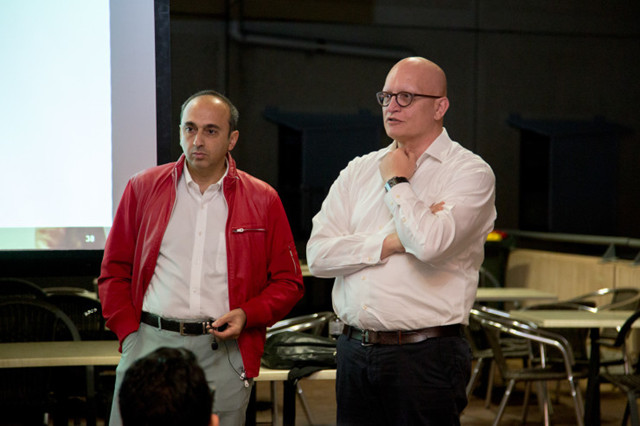Revealing the Myth of Coffee freshness (part two)

For professional baristas, please follow the coffee workshop (Wechat official account cafe_style)
Q3: some experts in the United States say: coffee should be kept fresh in the freezer. is that right?
When the temperature drops, the aging of coffee beans slows down. Changes in all ingredients, especially those related to aroma, will slow down 10 times. It has been proved that if your coffee is 10 degrees below room temperature, the rate of aging will slow down twice as fast, but this only means that you should lower the temperature of the coffee beans, but it does not mean that you should freeze the beans. In fact, freezing coffee beans may lead to changes in composition, and some of the beans may even crack.
Another problem is that when you try to freeze the coffee beans, once you take the coffee beans out of the freezer and open the package to let the warm air in, this will cause your coffee beans to cause serious damage and influence in terms of aroma and composition. The problems caused by the temperature difference on coffee beans simply outweigh the benefits of your cold storage.
Cold storage does help keep the coffee fresh, but because you have to open it at room temperature, the temperature difference destroys all the benefits. Unless the room temperature is also very low when you open it, the value of cold storage is only in the refrigerator, and it is worthless to open it at room temperature.
Q4: is fresh grinding really that important before cooking?
It's really important to espresso. A boutique coffee shop wants to show the flavor of espresso in a fresh state, the current mill can indeed extract more complexity and special aroma, but this is for espresso.
But as we delve deeper into the field of boutique, many people are like chefs who like to cook, trying to study coffee with various flavors. So, in addition to espresso, there are actually other ideas and possibilities. First of all, you have to think about what kind of coffee you want and what flavor you want to present, and then reconsider the freshness.
Generally speaking, the main outline of the flavor of products such as cold bubble or nitro (which makes coffee like beer) is not so related to freshness, but depends on the way it is extracted, so it can usually be preserved a little longer. Of course, the concept of freshness still exists. If you keep your cold coffee in the refrigerator for a year, the coffee will stink and go bad, but unlike espresso, it must be brewed immediately and finished in 30 seconds.
For espreeso, we must respect the value of freshness, bake it for a week or so, then grind it, cook it now, and drink it right away. This is the vitality of espresso.
But for other types of coffee, such as cold soaking or nitro, freshness is relatively less stringent. Freshness is still a part of flavor, you may want to have the element of freshness, but there are other ways to create more flavor besides freshness. This shows that freshness is not the whole flavor of coffee.
Q5: last question, you said espresso is a kind of coffee that lives on freshness. But what do you think of some boutiques (such as Gambib Coffee and Go Get Em Tiger in Los Angeles) who pregrind the coffee powder before brewing the espresso and leave it for an hour to challenge the fresh concept?
I think this is a very good experiment, because it is the only way for us to learn about coffee. The more rational we think and the braver we challenge, the more we will learn. Since people began to drink coffee, this is the most creative and creative era.
This is a great experiment on the so-called pre-grinding for an hour before cooking. The release of carbon dioxide after grinding will be accompanied by many chemical reactions, so pre-grinding for an hour will lead to a completely different flavor and extraction environment. The water content increased greatly in particular. It is also an interesting idea that some people use forced ripening in order to pursue a more perfect extraction. Pre-grinding for an hour before cooking, I would call it a way to adjust the best extraction time, and there are many aspects of this concept that need to be discussed.
I hope you can challenge the myth that freshness is an absolute condition, because no one can deny the possibility of cooking sweets after pre-grinding for an hour. We should not believe in the myth of freshness too much, and should try more experiments.
The other big question is: do you still think this coffee with unconventional extraction concept is espresso? If fresh is the life of espresso, will the espresso extracted by pre-grinding be a new kind of coffee? I don't know the correct answer, but what I'm sure is that espresso has unlimited possibilities and it's so much fun that we can explore as much as we can.
(end)
Original website: http://sprudge.com/5-incredible-myths-of-coffee-freshness-revealed-86011.html
Important Notice :
前街咖啡 FrontStreet Coffee has moved to new addredd:
FrontStreet Coffee Address: 315,Donghua East Road,GuangZhou
Tel:020 38364473
- Prev

Revealing the Myth of Coffee freshness (part I)
Professional barista communication please follow the coffee workshop (Wechat official account cafe_style) this article is translated from the sprudge.com website, there are a lot of news and interviews about coffee, but all in English, be patient when reading. The full text is translated by senior vvcafe. If you have any mistakes, please remind us who is the interviewer to reveal the myth of coffee freshness: Cn Yeretzian.
- Next

Maybe you're not drinking cappuccino at all (reprinted)
For the exchange of professional baristas, please follow the coffee workshop (Wechat official account cafe_style) [first let's take a look at the cappuccino written by others]. In fact, the seniors have their own ideas and observations about cappuccino, because I first learned cappuccino, about 13.14 years ago, when boutique coffee was brewing and quite chaotic, so various schools of cappuccino evolved.
Related
- Beginners will see the "Coffee pull flower" guide!
- What is the difference between ice blog purified milk and ordinary milk coffee?
- Why is the Philippines the largest producer of crops in Liberia?
- For coffee extraction, should the fine powder be retained?
- How does extracted espresso fill pressed powder? How much strength does it take to press the powder?
- How to make jasmine cold extract coffee? Is the jasmine + latte good?
- Will this little toy really make the coffee taste better? How does Lily Drip affect coffee extraction?
- Will the action of slapping the filter cup also affect coffee extraction?
- What's the difference between powder-to-water ratio and powder-to-liquid ratio?
- What is the Ethiopian local species? What does it have to do with Heirloom native species?

